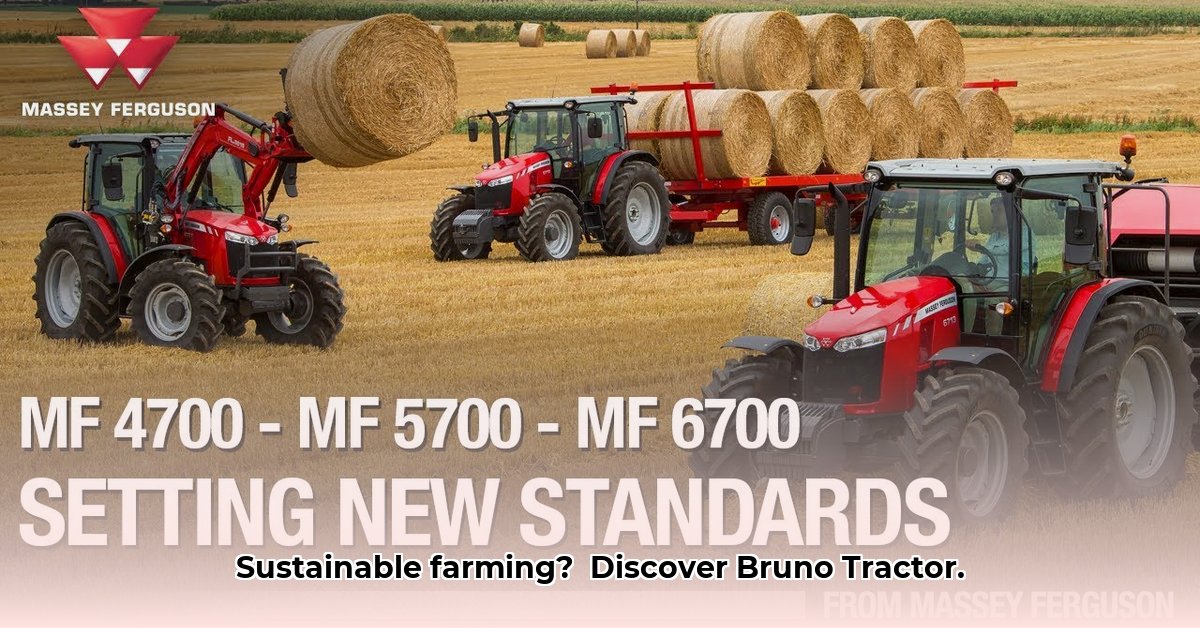
Finding affordable and environmentally friendly solutions is a constant challenge for today's farmers. The high cost of new equipment can be a major barrier, especially for smaller operations. But what if there was a way to access reliable machinery without breaking the bank? This is where pre-owned equipment, such as the Massey Ferguson tractors often found at Bruno Tractor, presents a compelling solution. This article explores the advantages and disadvantages of using pre-owned equipment in sustainable agriculture, providing a balanced perspective and actionable advice for farmers, dealers, and policymakers. For smaller farms, consider exploring other options.
The Economic Allure of Used Equipment
The financial benefits of purchasing used Massey Ferguson tractors are significant. For sustainable farmers operating on tight margins, the cost savings can be transformative, allowing them to reinvest in other crucial aspects of their operations, such as improving soil health or adopting renewable energy sources. Bruno Tractor, for example, offers a range of pre-owned tractors, providing farmers with access to reliable equipment at a fraction of the cost of new machinery. The ability to acquire high-quality equipment at lower capital expenditure is attracting increased interest. Isn't this a more financially sustainable approach?
The Ups and Downs: A Balanced Perspective
While the economic advantages of used equipment are clear, it's crucial to acknowledge potential drawbacks. Older tractors may have lower fuel efficiency, leading to increased operational costs. Maintenance and repair can be more challenging, with parts availability potentially posing a problem. Finding mechanics experienced with older models might also be difficult. However, these challenges are not insurmountable. Proactive maintenance, building relationships with specialized repair shops, and maintaining detailed maintenance records can significantly mitigate these risks. Many farmers successfully manage these issues, demonstrating the practicality of using pre-owned equipment. How can we achieve a balance between economic benefits and operational efficiency?
Navigating the Sustainability Trade-offs
The environmental impact of farm equipment is a complex issue. Manufacturing new equipment generates significant carbon emissions. Using pre-owned machinery immediately reduces that initial footprint. However, older models might consume more fuel, offsetting some of the environmental gains. A comprehensive lifecycle assessment (LCA) – analyzing the environmental impact from production to disposal – is needed for a complete picture. While readily available LCA data for specific models is limited, the discussion highlights a crucial point: sustainable farming requires a multifaceted approach that balances economic needs with environmental responsibility. What are the most effective ways to conduct lifecycle assessments on used equipment?
Sustainable Actions: A Collaborative Approach
Successfully integrating pre-owned equipment into sustainable farming requires a collaborative effort from various stakeholders.
1. Sustainable Farmers: Prioritize thorough equipment inspections before purchase, focusing on fuel efficiency and parts availability. Implement rigorous maintenance schedules and explore fuel-efficient upgrades where possible.
2. Equipment Dealers (e.g., Bruno Tractor): Provide detailed online listings with comprehensive specifications, including fuel consumption data and maintenance history. Consider offering extended warranties or service contracts to build customer confidence.
3. Policy Makers: Implement policies that incentivize fuel-efficient equipment, support mechanic training programs, and promote a circular economy model for agricultural equipment.
4. Researchers: Conduct comprehensive lifecycle assessments on various equipment types, develop advanced maintenance diagnostic tools, and investigate innovative sustainable materials for future equipment. The potential for advancements in AI within this context is particularly interesting. What are the long-term implications of these technological developments for sustainable farming?
Looking Ahead: A Sustainable Future
The future of sustainable agriculture depends on a balanced approach. While the economic benefits of used equipment are undeniable, a thoughtful consideration of the environmental implications is crucial. By working collaboratively – farmers, dealers, policymakers, and researchers – we can build a more environmentally responsible and economically viable agricultural industry. This ongoing journey requires adaptation, innovation, and a willingness to embrace a combination of pre-owned and newer, more efficient technologies as they become accessible.
This adaptive strategy, informed by a balanced perspective and collaborative effort, is key to building a sustainable and viable agricultural future. The continuous evaluation of practices and adaptation to new advancements remains crucial in the journey towards a minimized environmental impact.